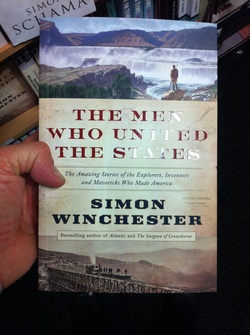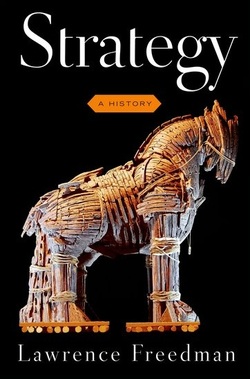|
The task of exposing the twelfth and last page of my desk calendar, in a couple of days' time, signals the arrival of the Christmas season in our household. As happens each year, my mind moves to the prospect of spending time with family and friends; to BBQs; to warm weather (as happens when one lives in the Southern Hemisphere); and, to the books that I'd like to read over the holiday period. This year, there are just three titles on my list. Hopefully one or more of them finds their way under the Christmas tree later in the month!  The Victorian City, by Judith Flanders. Flanders has written several books about Victorian London, none of which I've read. This particular title caught my eye when I was browsing in a local book store, perhaps as a result of my heightened awareness of the great city following my recent visit there.  The Men who United the States, by Simon Winchester. Winchester ranks amongst my favourite story-telling authors. I've enjoyed The Surgeon of Crowthorne, A Crack in the Edge of the World, and The River at the Centre of the World in the past. If this new title is comparable, then I suspect that I'm in for a treat.  Strategy: A History, by Lawrence Freedman. This newly published title has received critical acclaim from several well-regarded reviewers. It offers an expansive view of strategy and strategic thinking, from ancient military strategists (Achilles, Sun Tzu, Machiavelli) to modern business strategists (Drucker, Sloan). At 768 pages, I may take a while to get through this one!
0 Comments
I will be attending the 27th Australian and New Zealand Academy of Management (ANZAM) Conference, in Hobart, Australia, next week. The three-day gathering, from Wed 4 to Fri 6 December, is the premier conference for management scholars and practitioners in this part of the world, with over 340 research papers and several keynote presentations on the programme! Papers have been grouped into 15 topic areas, with up to eight streams of papers being presented at any one time. Consequently, delegates have the challenging task of deciding what papers they want to hear—a not insignificant logistics exercise for sure.
While I will not be presenting a paper this year, I will be sharing observations and insights during the conference, as I have done with other conferences. Please check back here later next week if you like to hear about the latest developments in the management field. I will be visiting the USA in March, to present a paper at the International Conference on Management Leadership and Governance, at Babson College, Mass., on 20–21 March. Currently, I have up to three days available (Fri 14, Mon 17, Tue 18) for meetings in or near San Francisco or Boston (my travel route) to provide assistance with, or speak into, any corporate strategy or governance matter that may be of interest to you or your organisation.
If you would like to take advantage of this, to have me speak, consult or provide some other contribution, please contact me to let me know how I can help. Angel investors are an interesting lot. They typically invest in start-up or early-stage companies, but such investments can be risky. Folklore suggests that, for every ten investments that an Angel makes, four will fail to provide any return, three will return the original investment, two will do reasonably well (2–5 times return), and one will do very well (5–10 times return). Sometimes this approach works (in terms of providing a positive overall return over a five to ten year period), and sometimes it doesn't.
Without wishing to sound cynical in any way, what motivates an angel? Generally speaking, they are wealthy individuals who have worked hard to build a capital base. Why would they risk eroding their base by making risky investments? I suspect many Angels are adrenalin junkies—gamblers even—where the possibility (and thrill) of high returns are simply too great to ignore. However this is not the case for all Angels. Some see their investments as philanthropic donations, to assist the next generation of entrepreneurs. Others are well-informed, astute and shrewd. Regardless of their motivation, Angels provide a much-needed source of capital for entrepreneurs—to test their ideas and try to get them off the ground. Bill Gates, Rod Drury and Sam Morgan are all beneficiaries, and look at them now! The ECMLG conference is over again for another year. The second day saw another twenty papers (approximately) delivered, by some very capable scholars. As happened on the first day, most of the presentations on day 2 were well received, with some very good questions and discussions during question time.
The following bullet points are my summary reflections, having just returned to my hotel room after an end-of-conference dinner with six other delegates:
Looking ahead to next year, the 10th European Conference on Management Leadership and Governance will be held in Zagreb, Croatia, in October 2014. I have already pencilled the conference in my diary, with a view to presenting my final thesis findings to the world. Marina Lovrincevic (University of Split, Croatia) presented a very interesting paper on the relationship between supervisory board efficiency and stakeholder orientation. In so doing, Lovrincevic exposed a chasm between the Euro-centric view of the sustainable purpose of the company (based on stakeholder theory) and the Anglo-American view (agency theory).
Lovrincevic's analysis, of empirical data from a sample of Croatian non-financial listed companies, asserted that supervisory boards are helpful to protecting the interests of the wider set of stakeholders. An interesting debate ensued, essentially comparing and contrasting the Friedman view (value maximisation for the shareholder) and the stakeholder view (value distribution). The audience seemed to agree that the paper provided an interesting platform for future research, particularly research to explore whether a modified view of stakeholder theory might provide a more complete basis for effective governance. Prof Vlado Dimovski (University of Ljubljana, Slovenia, and formerly a Minister in the Slovenian government) spoke on the topic of advanced approaches to leadership, from the perspective of his experience in Central and Eastern Europe.
After providing a summary of leadership in socialist Yugoslavia (where leadership was not discussed—indeed it was suppressed), Dimovski caught the audience's attention when he answered the classic question Are leaders born or made? with "Yes". In so doing he introduced the concepts of holistic leadership and complexity. He went on to challenge the superman leadership paradigm which dominates western thought and practice. Rather than criticising Western thought and practice outright—and promoting Eastern philosophies as "better"—Dimovski challenged the audience to consider the possibility that effective leadership might best be built on a "both–and" model. He then suggested three frameworks that may be helpful to leadership practice in the future:
Dimovski's paper was well received by the audience, some of whom said to me beforehand that they were expecting to hear from a "socialist evangelist". However this was not the case. We need to hear more from people like Dimovski. The first day of the 9th European Conference on Management Leadership and Governance is over. During the course of the day, some 29 peer-reviewed research papers were presented, in addition to Sloan's keynote at the beginning of the day. Some of the highlights and reflections from day 1 are listed below:
The ECMLG programme this year includes several papers on IT governance and related technology topics, which indicates an increasing level of interest amongst management, leadership and governance researchers. Some of the papers I attended and/or read include:
Amongst these, an encouraging theme—of linking IT priorities with corporate business objectives—became apparent. This is heartening because, in my experience, many IT aficionados have been more interested in the evangelism of capability and particular methods and processes. James Lockhart (Massey University, New Zealand) presented a paper which challenged the underlying foundation that has supported the majority of the governance research and practice over the last four decades. Lockhart opened by contending that the focus that many boards have on compliance has produced a generation of defensive, reputation-protecting boards, as opposed to boards that focus on business performance. Lockhart asserted that governance attention needs to change, away from compliance and towards factors that effect performance:
These points provide a useful basis for future governance research, and for practice. However, they assume that directors and boards have the competence and inclination to change their behaviours and embrace them—an assumption which, unfortunately, cannot be taken for granted. |
SearchMusingsThoughts on corporate governance, strategy and boardcraft; our place in the world; and other topics that catch my attention. Categories
All
Archives
May 2024
|
|
Dr. Peter Crow, CMInstD
|
© Copyright 2001-2024 | Terms of use & privacy
|

